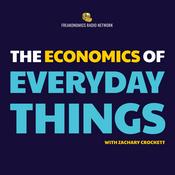7 episodes

07. World-leading tech in the Aussie Outback
18/08/2021 | 25 mins.
The Jindalee Operational Radar Network – or JORN – is considered one of Australia’s greatest defence innovations. Located in the heart of the outback, JORN is a network of three over-the-horizon radars with long-range threat detection capability. It plays a vital role in surveillance by helping our defence force see 1,000s of kilometres past the horizon, enabling them to protect our expansive coastline beyond line-of-sight. One of our greatest defence triumphs didn’t happen overnight. The JORN story began in World War II as Australia faced one of its biggest military threats. Join host Lily Serna as she travels to remote Australia to meet the people behind this home-grown technology and discover why JORN is the jewel in Australia’s defence crown. Guests: Doctor Bruce Ward, Defence Science and Technology Honorary Fellow, Adjunct Professor, School of Physical Sciences, University of Adelaide Doctor Gordon Frazer, Chief Executive Officer, Frazer Lab Doctor Tom Lewis OAM, Military Historian Brad, Site Lead, JORN, BAE Systems Australia Lee, recently joined the team at the Longreach site, BAE Systems Australia Liz, Software Team Lead, BAE Systems Australia

06. Sky-high: 100 years and counting
21/07/2021 | 26 mins.
It took Ross and Keith Smith 28 days to complete their historic UK-Australia flight in 1919. From then, Australian aviation has come a long away – we now see unmanned aircraft in the sky and some of the most advanced jets in the world flying at speeds of almost 2,000 km per hour. Today, the Royal Australian Air Force (RAAF) is world class Air Force with a proud 100 year history and a very inspiring future that will see a growing fleet of the F-35 Joint Strike Fighter - one of the most advanced aircraft in the world. Join Lily Serna as she takes a look at the evolution of Australian military aviation and meets the people and technologies driving this vibrant industry. Technically Possible travels back in time to that historic Smith Brothers flight and looks at the future technologies taking our next-generation sky high.

05. You can’t be what you can’t see
22/06/2021 | 22 mins.
Currently in Australia, less than 20% of Engineering students are female. And in the defence industry, female engineers make up less than 15% of the workforce. Despite campaigns by governments and industry, women remain underrepresented in Science, Technology and Maths (STEM) careers and while progress has been made, there is much more work to do. So how do we encourage more women into STEM? Join Lily Serna as she meets some of the inspirational females making their mark in the defence industry, paving the way for future generations. Who are these trailblazers and STEM advocates? Professor Tanya Monro - Australia’s Chief Defence Scientist, first female Chief Defence Scientist Gabby Costigan - CEO BAE Systems Australia, first female CEO of an Australian Defence Prime Deborah Jeppesen - Manager of Intelligence at Thales Australia, first female RAAF pilot Jackie - young aspiring female engineer, BAE Systems Australia

04. Meet the Digital Ship
26/05/2021 | 23 mins.
Enter the world of the digital shipyard. Using virtual reality, smart sensors and 3D visualisation, a new generation of workers is changing the way we build and maintain ships, automating traditional processes and revamping labour practices. Join host Lily Serna as she meets the people who are using smart technologies to revolutionise Australia’s maritime industry. The Osborne Naval Shipyard in South Australia is one of the most technologically-advanced shipyards in the world. You can also read about the digital revolution that is taking place in shipyards and sustainment in Australia.

03. Maritime Muscle
28/04/2021 | 26 mins.
As the world’s biggest island, Australia has a vested interest in shipbuilding. And with the launch of the multi-billion dollar Hunter Class Frigate Program, Australia’s defence industry has the opportunity to become an international maritime power – but can the nation pass the test? In this episode Lily Serna hears from the people behind this significant defence project and explores what it takes to deliver world-class, sustainable shipbuilding capability for Australia. The Hunter Class Frigate Program will deliver nine anti-submarine warfare frigates to the Royal Australian Navy – but it’s delivering much more than ships. It will transform the nation’s shipbuilding and sustainment capability and is expected to generate 6,300 jobs and $17 billion for the economy.
More Business podcasts
Trending Business podcasts
About Technically Possible
Listen to Technically Possible, She's On The Money and many other podcasts from around the world with the radio.net app

Get the free radio.net app
- Stations and podcasts to bookmark
- Stream via Wi-Fi or Bluetooth
- Supports Carplay & Android Auto
- Many other app features
Get the free radio.net app
- Stations and podcasts to bookmark
- Stream via Wi-Fi or Bluetooth
- Supports Carplay & Android Auto
- Many other app features


Technically Possible
download the app,
start listening.




























